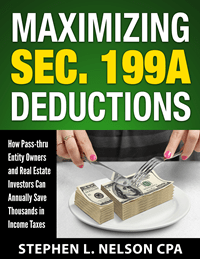 The meals and entertainment deduction rules for 2018 differ from those used in the past.
The meals and entertainment deduction rules for 2018 differ from those used in the past.
If you’re a business owner or real estate investor, you want to know how the new 2018 rules work.
You’ll sidestep hassle and maximize your savings with just a wee bit of buffing up.
Old Meals and Entertainment Deduction Rules
Let’s start by quickly reviewing the old rules, since the meals and entertainment deduction rules for 2018 build on top of these.
The old rules said you can generally deduct 50% of the costs of meals and also entertainment if the spending amounts to an “ordinary and necessary” expense of you running a trade or business or producing or collecting income.
Note: The production or collection of income includes things like direct real estate investment.
Tax laws then explain that “ordinary and necessary” includes meals expenses when an employee or owner travels away from home.
For example, you get to deduct the meals incurred during a business trip to some far away state. A trip to an industry conference works, for example. So does a trip to visit your major supplier or customer.
The catchall “ordinary and necessary” also includes local meals as well as entertainment expenses if the meal or entertainment allows the employee or owner to “do business” with a new or prospective customer or vendor, maybe an employee, or some other clearly-legitimate business contact.
The “doing business” requirement further specifies to be deductible you need to be able to say (and prove) that either the meal or entertainment directly relates to the business (for example, you conduct a business meeting over a meal) or that the meal or entertainment follows or precedes some other “real” business event like a meeting.
And this important point: A vague, general expectation of some tangential business benefit doesn’t pass muster.
For example, if you buy a coffee or a beer for your banker, you get to deduct the costs if over the meal you do a little business. (Maybe you talk about interest rate options on the loan you need to renew next quarter.)
But if you invite a buddy who happens to be a banker over to a backyard barbecue based on the idea that you might get a loan from his bank? You don’t get to deduct the costs of that meal.
By the way, entertainment costs work as 50% deductions too as long as you have the opportunity before, during or after the event to “do a little business.” But “doing business” means the event either directly relates or either precedes or follows something concretely business.
Finally, an employer can also deduct as “ordinary and necessary” 100% of the cost of meals provided at the worksite for the employer’s convenience.
For example, suppose you have a crew of construction guys working at some remote building site. If you go out and grab a bunch of pizzas to feed the crew their lunch on the job site, that should be deductible.
Understanding the Old Sec. 274(n) Exceptions
And then this wrinkle: While most meals expenses produce only 50% deductions, some business meals produce 100% deductions.
The “100% deductible” category includes items that qualify as “de minimis fringe benefits” which means meals and beverages provided on site (like morning coffee or pizza on Friday afternoons) and then occasional holiday events like a Fourth of July party, maybe a Thanksgiving turkey to employees, and the end of year holiday dinner.
The “100% deductible” category also includes meals provided to employees working in a restaurant or at a catering event, on a vessel where federal law requires meals for employees, and in a handful of other specialty situations, too, like on an offshore or Alaskan oil or gas drilling site. (Those rules appear here.)
For example, if you run a catering service and you feed the staff working the wedding reception you’re catering, that food you get to deduct 100% of.
Meals and Entertainment Deduction Substantiation
You and I don’t get to just call meals or entertainment expenditures a “deduction” and then that’s good.
We need to substantiate the business purpose of the expense by proving its “business-y” enough.
For travel-related meals, you want to collect and save documentation that proves your travel was primarily for business. For domestic business travel, the documentation needs to show that more than fifty percent of your workweek days were spent on business. (International travel rules are more complicated, but we do describe them in our Small Business Tax Deduction Secrets monograph.)
For local meals and for entertainment, you need to explicitly document the expense and business purpose by dating and describing the expenditure, identifying the people present at the meal or event, and then briefly describing the business event that occurred before, during or after the meal or entertainment.
Something like the following should work for a local meal or entertainment expense because the expenditure directly relates to your business if you scribble the information on the receipt you get from the barista:
11/26/18: Coffee with Steve, CPA, to discuss new Sec. 199A deduction.
The receipt will provide the amount. The scribbling provides the date, people present, and the “directly related” business purpose.

And the following should work for a local meal or entertainment expense because you can “associate” the expenditure with substantial business discussion:
2/8/18: Bought drinks for Bob (attorney), Beth (accountant), after all afternoon meeting with Acme Industrial, the potential buyer of my small business.
Two quick cautions. First, many retail receipts fade over time. You probably want to scan and save these sorts of perishable receipts so you still have a legible copy three years later should the IRS audit your return. (We have had clients lose deductions on audit because the ink fades.)
Second, if you don’t want to substantiate, you ought not deduct. You and I “earn” the deduction, in a sense, by documenting the business purpose of some meal or entertainment expenditure.
Meals and Entertainment Deduction Rules for 2018
Once you know the current (or old) rules, learning the new meals and entertainment deduction rules is easy.
The table below summarizes things. But in a nutshell, you lose the entertainment deduction and the “In-house cafeteria and work site meals and beverages” shrinks from 100% to 50%.
| Meals and Entertainment Deduction Rules | Old Rule | New Rule until ’25 | Rule after ’25 |
| Business meals and meals while traveling | 50% | 50% | 50% |
| Entertainment | 50% | 0% | 0% |
| In-house cafeteria and work site meals and beverages | 100% | 50% | 0% |
| Primarily recreational, social and similar activities for employees, presumably also including holiday parties | 100% | 100% | 100% |
Finally, just to say it, note that meals are still 50% deduction.
Further, expenses (including meals) provided as part of recreational, social and similar activities primarily for the benefit of employees stay 100% deductible. I think this means an end-of-year holiday party still counts as a 100% deduction.
Interested in even more info? Subscribe to our free mailing list
We regularly blog about taxes. Especially new tax laws related to small businesses and individual investors. You may want to consider subscribing to our free monthly-ish newsletter. You can subscribe anytime.